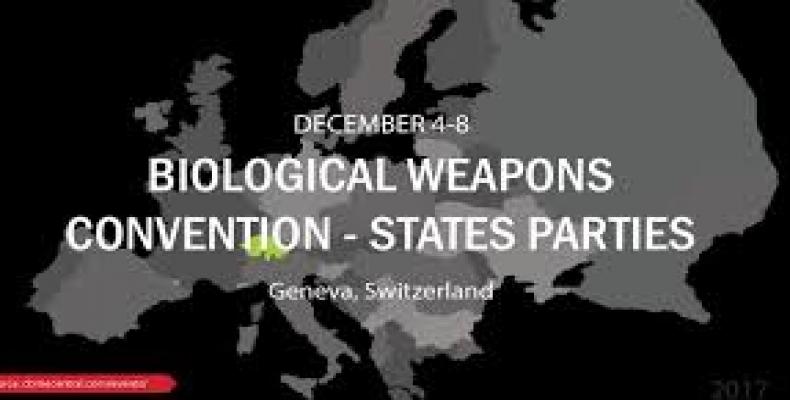Geneva, December 5 (RHC-Minrex)-- The meeting of States Parties to the Convention on Biological Weapons is underway in Geneva, with the participation of Cuba among the 179 member nations.
The Ambassador of Cuba to the United Nations in Geneva, Pedro Luis Pedroso Cuesta, spoke at the debate, denouncing the U.S. blockade against Cuba and calling it the main obstacle facing the island for a broader and more effective international cooperation and assistance in the sphere of biological activities.
Pedroso Cuesta referred to the importance of adopting a mandate to restart, without further delay, the negotiations of a protocol to strengthen the convention. He recalled how since 2001, due to the unjustified interruption of negotiations by the United States, the international community is aspiring to the adoption of that additional legal instrument, including a verification mechanism.
The Cuban diplomat called for the promotion of international cooperation, without restrictions or unilateral and discriminatory limitations, for the economic and technological development of states, particularly developing states, as an indispensable aspect to face the current challenges.
Pedroso Cuesta reaffirmed that the exchange or use of biological agents, materials, equipment and information for peaceful purposes can not be limited. He pointed out that it is necessary to reduce the growing gaps between developed and developing countries in the fields of biotechnology, genetic engineering, microbiology and other related areas.
The Convention on the Prohibition of the Development, Production and Stockpiling of Bacteriological (Biological) Weapons and Toxins and on Their Destruction is part of the instruments of international law designed to prevent the suffering caused by war. At the end of the First World War, the use of chemical and bacteriological means of war was widely condemned, which was prohibited in the Geneva Protocol of 1925, the precursor instrument of the Convention. The Convention, drafted in the framework of the Conference of the Disarmament Committee, and approved by the General Assembly of the United Nations, was opened for signature in London, Moscow and Washington on April 10, 1972. It entered into force on the 26th of March 1975 and is binding today for a large majority of states.
Approved with a view to achieving effective progress in disarmament, the Convention marked a decisive milestone in the prohibition and elimination of weapons of mass destruction. Its ultimate goal is to completely exclude the possibility that bacteriological (biological) agents and toxins are used as weapons.
Cuba has been party to the Convention since April 21, 1976, and strictly complies with all the obligations of this instrument. The country has a national legislation as well as applying programs that are reinforced through a system of control mechanisms, which extend to all facilities with biological risk, and those that are part of the national system of accountability and control of these materials.
Cuba enjoys international recognition for the progress made in the field of biology for peaceful purposes. The biotechnology sector has developed new products, medicines, equipment and services to improve the health of the Cuban people. Cuba has also achieved the generation of exportable goods and services as well as advanced technologies for food production.
Cuba Denounces Washington's Blockade at Biological Weapons Convention Meeting in Geneva

Related Articles
Commentaries
MAKE A COMMENT
All fields requiredMore Views
- U.S. House of Representatives set to vote on bill of fines or prison for boycott of Israel
- Israeli TV producer’s call for Holocaust against Gaza population sparks outrage
- Nicaragua withdraws from UNESCO after award to right-wing opposition newspaper promoting violence and destabilization
- 290,000 children on brink of death: Israel starves Gaza amid global silence
- Venezuela denounces false narrative regarding safe-conduct granted to opponents

